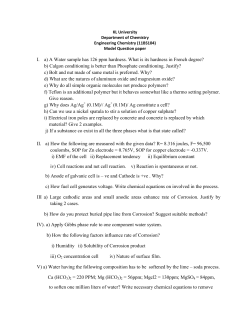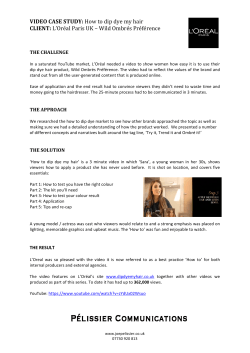
Why you will be red-hot for this zinc flake system:
DELTA® protects surfaces. Why you will be red-hot for this zinc flake system: large components automotive Innovative micro-layer corrosion protection for large components. We thought bigger, further and longer. Dörken MKS-Systeme proudly presents the intelligent alternative to hot dip galvanizing for sensitive high-tensile steels: DELTA-PROTEKT® KL 101. DELTA® protects surfaces. Efficient coating – however large the component. large components automotive Today, we would like to talk about hot dip galvanizing – or rather about a welcome alternative: zinc flake systems. In the automotive industry, large compon ents made of steel are often hot dip galvanised to protect them from corrosion. But this method brings with it the risk of damage to the surface of the component, leading to hydrogen embrittlement. We have thought this through and developed a solution: DELTA-PROTEKT® KL 101. The innovative zinc flake system DELTAPROTEKT® KL 101 was developed especially for the sensitive high-tensile steels used in the automotive and wind power industries. It offers high-performance corrosion protection and has many advantages compared with hot dip galvanizing: Much lower application temperatures. Lower energy costs. More economical material use. And best of all, improved corrosion protection, even in the field of microlayers. This gives it a huge range of possible applications. Delta-Protekt® KL 101 is used in the automotive industry, for example on chassis, axle beams, integral beans and suspension arms. However, particularly in the floor assembly of a vehicle, suspension arms and other components are not only subjected to high levels of exposure to chemicals from oil, brake fluid and de-icing salts, but they also need to be able to stand up to mechanical strains, for example caused by Product fact-file DELTA-PROTEKT® KL 101 Product description - zinc flake basecoat with cathodic barrier effect, improved adhesion and abrasion resistance - no hydrogen embrittlement of high-tensile steels that is associated with the application - no liquid metal embrittlement - corresponds to EU 2000/53/EC heavy-metal free of nickel, cadmium, lead, chromium, mercury, molybdenum Cathodic corrosion protection SST (red rust)* > 1.000 h Coefficient of friction, DIN EN ISO 16047* Friction-specific topcoat adaptation available Temperature resistance, 96 h at 180 °C in compliance with VDA 235-104 very good Stone resistance, DIN 55996 very good Curing temperature 230 – 250 °C Colours available silver, colour adjustment using topcoat possible *depending upon geometry, system set-up and application process chippings and stones being thrown up. For this reason too, BMW and Daimler use zinc flake coatings on the suspension arm of various models. Because they offer high-performance corrosion protection in the micro-layer field and are particularly resistant to stones. Most importantly, thinner layers mean lower vehicle weight, which means lower energy consumption. zinc flake system is a true innovation, which brings only advantages. And you can only be red-hot enthusiastic about that. So as you can see: compared to hot dip galvanizing, our DELTA-PROTEKT® KL 101 Corrosion protection after stone test * Time before red rust (in hours) Application temperature ranges Temperature °C 600 560 500 2.000 470 445 400 1.000 300 200 530 250 230 0 DELTA-PROTEKT® KL 101 + DELTA-PROTEKT® VH 390 (black surface) DELTA-PROTEKT® KL 101 + DELTA-PROTEKT® VH 301 GZ (silver surface) *depending upon geometry, system set-up and application process 100 0 zinc flake systems standard temperature high temperature hot dip galvanizing hot dip galvanizing Dörken MKS-Systeme GmbH & Co. KG Wetterstraße 58 D-58313 Herdecke Fon:+49 2330 63-243 Fax: +49 2330 63-354 www.doerken-mks.com mks@doerken.com A member of the Dörken-Group. issue 04/09 The details stated in this technical leaflet are based upon our current knowledge and experience. They do not release the user from the testing that is inevitable, given the diversity of possible influences in the processing and application. Liability for specific properties or suitability for any concrete operational purpose may not be assumed from the information provided.
© Copyright 2025





















